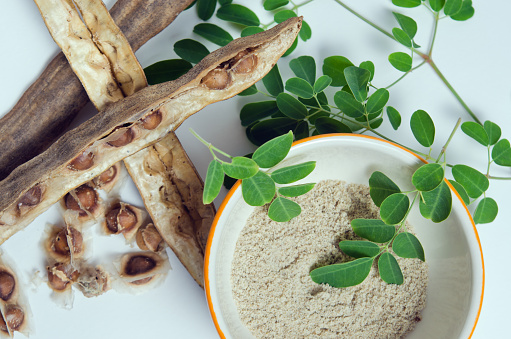Moringa – The Nutrient Powerhouse You’ve Probably Never Heard About

While you may have enjoyed a peppery taste in one of your favorite Southeast Asian dishes, you may not know that the plant that could be flavoring that dish is called moringa. The plant, whose full name is moringa oleifera, is also known as the ben oil tree, horseradish tree, miracle tree and drumstick tree.
A distant cousin to cabbage, broccoli, and kale, moringa is native to India. It may also grow in other tropical or subtropical zones such as Asia, Latin America, Central America, the Caribbean, and Africa. It can also grow year-round in the U.S. in southern Texas, Florida, California, and Arizona.
Moringa is packed with vitamins, minerals, protein, and antioxidants. Given its nutritive value, moringa is a food source in many parts of the world where it is grown. It’s also interesting to note that every part of the moringa plant – pods, seeds, leaves, and flowers – is edible. In the U.S. and other western countries, it also is used as a supplement which is commonly sold in a powder form of the moringa leaves.
The plant’s pods are like green beans and the seeds are prepared in much the same way as peas or roasted. The leaves can be cooked like you would spinach. The powder form, in addition to being used as a supplement, can also be used as a condiment. Both the flowers and leaves can be used as base for tea. Moringa continues to grow in popularity in a variety of areas with some pundits predicting it will be a food trend of 2022 as an alternative to matcha.

Moringa's Nutritional Value
Because of its nutrient, antioxidant, and anti-inflammatory properties, proponents of moringa claim it may help with a variety of conditions such as edema, asthma, diabetes, and stomach upset. It also may support your cardiovascular system, kidneys, liver, and cholesterol and weight management efforts. More research needs to be done to confirm these claims about the specific health benefits of moringa since many studies are still in the preliminary stages and others have so far only been with laboratory animals.
Moringa is a true powerhouse when it comes to nutrition. It contains 92 nutrients as well as all nine essential amino acids. These include:
- Vitamin B1 (thiamine) – Helps your body convert the food you eat into energy. It also is important for cell health.
- Vitamin B2 (riboflavin) – Plays an important role in converting carbohydrates from your food into glucose. It also helps metabolize protein and fats.
- Vitamin B3 (niacin) – Helps with the proper functioning of every part of your body. It also may boost brain function and help lower cholesterol.
- Vitamin B5 – Helps your body make and break down fats.
- Vitamin B9 (folate) – Helps convert the food you eat into energy.
- Vitamin C – Moringa reportedly has up to seven times more of this vitamin than oranges. In your body, vitamin C – also known as ascorbic acid – plays a key role in forming blood vessels, muscles, collagen, cartilage as well as supporting your immune system.
- Vitamin E –Helps protect your body against what are known as “free radicals,” which can damage your cells.
- Vitamin K – Helps your blood clot correctly as well as helping build heathy bones.
- Calcium – Helps build strong teeth and bones, a healthy nervous system, and the proper functioning of muscles.
- Potassium – Helps your nervous system function and your muscles contract as well as maintaining a regular heartbeat.
- Iron – Your body uses this mineral to make hemoglobin, which your red blood cells use to transport oxygen throughout your body.
- Magnesium – Helps support your immune system, maintain nerve and muscle function, and keeps bones strong.
- Phosphorus – Works with calcium to build strong bones and tooth enamel. It also is important for helping your body store and use energy, maintain cognitive health, and regulate your heartbeat.
- Zinc – Plays an important role in keeping your immune system working as well as supporting wound healing. It also plays a role in your sense of smell and taste.
Other benefits of moringa are that it has no cholesterol, is very low in fats, and is high in fiber. It has antioxidants including beta-carotene, quercetin, flavonoids, polyphenols, and chlorogenic acid.
One cup of chopped moringa leaves also has two grams of protein (reportedly more than kale) while 100 grams of moringa leaf powder offers 25 grams of this critical nutrient.
How to Include Moringa in Your Healthy Diet
You can use the moringa leaves, pods, and seeds in your daily cooking. If you purchase moringa with the leaves still attached to the stalk, you can easily remove them by sliding your thumb and index finger over the stalk. Rinse the leaves and they are ready to be added to soup dishes, as an ingredient for condiments such as pesto, or added to veggie or meat patties and meatballs.
If you want to use the seeds that are in the pods, you open the pods as you would for peas and then cook them. As an alternative, you can also cook whole pods or use them in a soup.
Should you decide to purchase moringa powder instead of the plant itself, you can add this to smoothies, include it in your baking recipes, add it to salad dressings, or even add it to your favorite vegetable dip.
If you want to use moringa capsules or powder as a supplement, talk with your doctor first to ensure it is appropriate for you and that it will not interact with any medications you may be taking. Also remember that you should only get supplements from reputable manufacturers whose products are tested for quality and content by independent laboratories. Finally, you should consider getting a comprehensive nutrient test to see if you have any nutrient deficiencies or imbalances.
Enjoy your healthy life!
The pH professional health care team includes recognized experts from a variety of health care and related disciplines, including physicians, attorneys, nutritionists, nurses, and certified fitness instructors. This team also includes the members of the pH Medical Advisory Board, which constantly monitors all pH programs, products, and services. To learn more about the pH Medical Advisory Board, click here.







